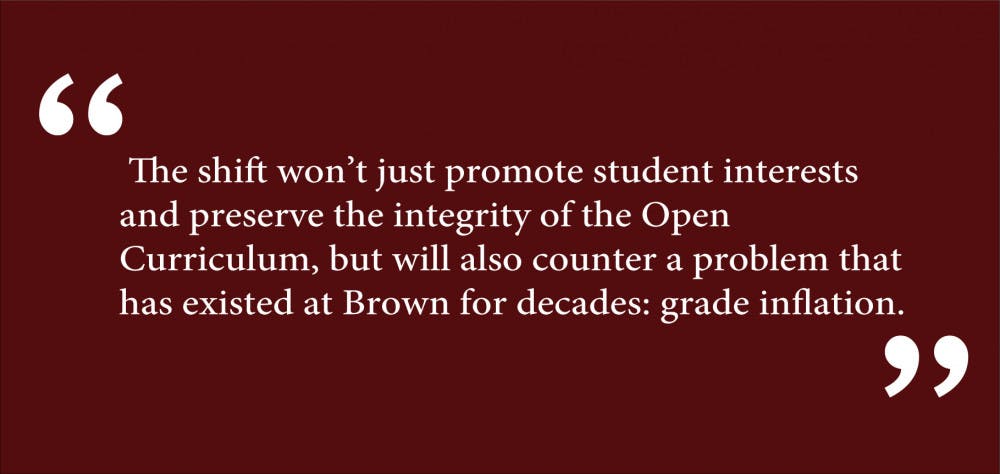On Oct. 16, the College Curriculum Council held a forum to discuss the possibility of moving the drop deadline forward for undergraduate students. Under the proposed motion, the deadline would shift from the week before finals period to the middle of the semester. While explaining the reasons for the shift, Dean of the College Maud Mandel claimed that many students drop classes near the end of the semester in a “grade management” strategy that operates against the ideals of the Open Curriculum. She also claimed that by implementing a drop date change, the CCC could prevent the “cascading negative impact” that culminates in students retaking dropped classes over the winter or summer at their own financial expense.
These claims certainly make sense and are ostensibly well-intentioned: Why not save students the money and effort of retaking classes if it was that easy? Well, maybe because it’s not. Brown students should feel a little skeptical of such an obvious solution to an entrenched student quandary. In reality, the CCC’s decision is probably less benevolent than the reasons put forth at the forum suggest. The shift won’t just promote student interests and preserve the integrity of the Open Curriculum, but will also counter a problem that has existed at Brown for decades: grade inflation.
Grade inflation, the label given to the steady rise in average GPA over time, is the highest at Brown out of all the Ivy League schools. The CCC’s proposal could well change that. Dean Mandel bemoaned that 40 percent of all drops occur in the last two weeks of the semester; the CCC aims to convert these drops into C’s. Should this proposal pass, it would inevitably add more C’s to the overall grade count at Brown. Though this sounds like something to avoid, it would in fact be a public relations win for the University, as it would put Brown on par with the other Ivy League universities in terms of average GPA and grade inflation rates. But what the CCC has probably not considered are the negative consequences of the drop deadline change, such as the perverse incentives it would give to faculty and the unfair pressure on students.
First of all, faculty members could respond to the change by simply adjusting their grading curve to minimize the number of C’s awarded. Lecturers will be especially prone to this because they are awarded promotions and contract renewals based on student evaluations. I highly doubt that students who expect to get C’s will give their professors glowing evaluations. As a result, students who happen to take a class with a tenured professor may be more likely to receive a C than students who take a class with a lecturer who is up for a contract renewal. Although this phenomenon might already occur on campus, the drop deadline change certainly won’t help it — in fact, it might amplify it. Thus, the change could just recast the problem of grade manipulation at Brown into another, less obvious form.
I should also point out that homework and midterm grades frequently arrive much later than expected. Since graduate student TAs are often underpaid and overworked to the point of unionization, they sometimes take weeks to grade undergraduate assignments: I have received homework grades as late as two weeks after the submission deadline. This leads to a pretty wide disconnect between a student’s perception of their performance and their actual grade in the class. This could push some students to take a class S/NC when they should have taken it for a grade, and vice versa. To eliminate the late drop as a recourse for this grading asymmetry would be incredibly unfair. If the drop deadline is moved up, students will likely be staring at blank Canvas pages, begging their TA’s for grades and making uneducated guesses about their performance right before the mid-semester deadline. I already beg my TA for enough. Why should I have to beg them for a homework grade? The proposed deadline would create unnecessary confusion and pressure for both students and TAs.
With regard to the Open Curriculum, it’s pretty obvious that the drop deadline advancement will counteract its mission. Students, in an even more obvious attempt to avoid C’s, will avoid taking risky classes at all. This means that students will avoid expanding their skill sets in earnest by taking classes outside of their concentrations for a grade. And even within concentrations, students will eliminate more difficult electives or course sequences from consideration for fear of getting caught with a C at the end of the semester. Altogether, the change will push students away from exploring and challenging themselves — the very core of the Open Curriculum.
And last but not least, a drop deadline advancement will affect the community’s well-being by lowering grades and making students more stressed about receiving C’s. This is of particular concern at Brown because students are accustomed to grade inflation and generally expect higher grades because of the long-running trend. Moreover, this will force students who might otherwise drop the class in an effort to safeguard their mental health and focus on other classes to frantically study for finals in an attempt to avoid a C.
In short, the University should not move its drop deadline forward because it will result in a host of unintended consequences that could undermine the University’s goals and place unnecessary pressures on students and TAs alike. Until issues such as the lecturer incentives system and the treatment of graduate student TAs are dealt with in their entirety, the CCC should take the drop deadline change out of consideration.
Andrew Friedman ’19 can be reached at andrew_friedman@brown.edu. Please send responses to this opinion to letters@browndailyherald.com and other op-eds to opinions@browndailyherald.com.





